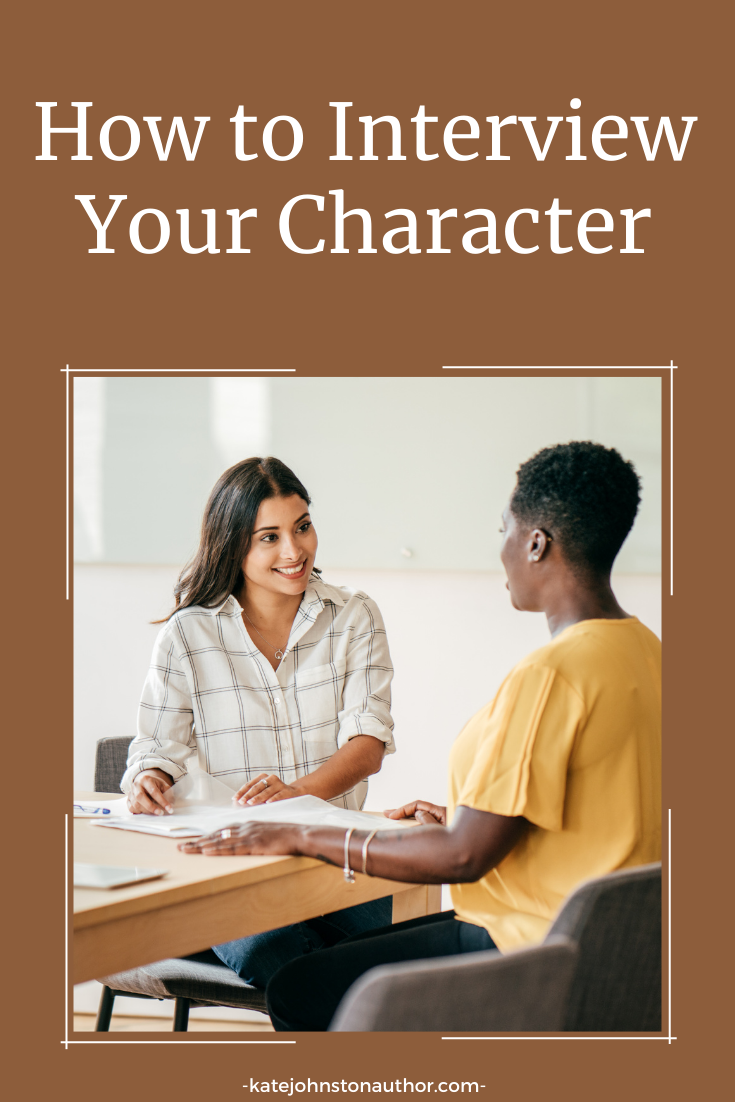How to Interview your Character
Character development is an important element of any fictional story. Interviewing a character about his or her life can help you develop a believable character instead of a flat one.
Today I’m giving you some ideas on how to interview a character, the kinds of questions to avoid, and how to decide which information actually belongs in your story.
I’m not a big fan of doing character profiles that span years of randomness that may or may not make it into the story. In some cases, the background detail can inform the story we’re writing—but in other cases, not so much.
We can actually get ourselves in a bind with “information dump” or “irrelevant information” because we *think* we should include this fun, cool, or interesting detail that surfaced. Randomly. For no reason.
Getting to know your characters is vital however. You want to make sure you’re providing the right kind of detail that will support, inform, or advance the story. Not act as just pretty decoration.
One way to do that is through interviewing your characters about a specific time in their life that has some kind of impact on their story goal or the obstacles getting in the way of their story goal. You may find, as you’re writing one of your early drafts, that you don’t have a clear idea of why your main character lets their flaws interfere with their relationships.
Or you might not know enough about a strength that can help your main character out of a jam. When this happens (and you’re ready to do some character research—I don’t generally suggest you interrupt getting your story down on paper/screen to do any kind of research), then think about important events that might have shaped your character’s life.
A SAMPLE LIST OF LIFE EVENTS
Birthday party (either their own or a friend/family member)
Learning a skill
Death of a loved one
Long-term illness
Winning/losing a championship
Falling in love
Betrayal by loved one
Bullying
Abusive family member
Home/property is robbed
High school graduation
Moving to a new town
Losing a job
Divorce
Making the team
Recital
Next, come up with 50-100 questions to help you see the character come to life through the event you’re exploring. Give yourself a mix of questions. Yes/No questions are perfectly fine.
If inspiration strikes and you envision your character in action based on how you answered a question, then explore that further.
HERE’S AN EXAMPLE OF A CHARACTER WHOSE OLD HIGH SCHOOL FLAME COMES BACK INTO HER LIFE:
Something is wrong between them, but the author can’t put his finger on it. He decides he needs to know not just about his protagonist’s old relationship, but what life in high school was like for his protagonist.
Because high school life covers a lot of ground, you want to be careful you don’t go into areas that have nothing to do with your story goal.
A good rule of thumb is to ask questions that can shed light on your protag’s motivations. For example, if your protag doesn’t play any kind of musical instrument in the story, or if playing music is not part of the story, then don’t bother asking your protagonist questions about whether he/she played in the high school band.
HERE’S A BRIEF EXAMPLE OF CHARACTER INTERVIEW QUESTIONS:
Why did you break up with your high school flame?
Did you go to prom together?
Did you (or your flame) date anyone else in high school?
What was a popular date hangout?
What kind of grades did you get?
Teacher’s pet?
Where did you live?
Were you popular?
Ever get suspended from school?
Did you skip school?
Siblings?
Favorite subject?
Did you play a sport?
What did you do in your free time?
How did you travel to school?
What was the name of the most popular girl/boy?
Did you follow the career path you planned?
Still close with your best friend?
Who was your favorite teacher?
What was your style?
Favorite music?
Was bullying a problem?
Teenage pregnancies?
Were you on student council?
Parents’ involvement?
Your job as the interviewer is to pick up on cues from your main character, which can come to you in a variety of forms. You might get a figment of an idea to spin-off from what your MC did in her free time. You may be able to picture your MC while she’s answering—watch her body language, hear the tone of her voice, listen for what’s not being said. Push for more info when you feel like you’re onto something juicy.
If a question starts leading you into a mini-story, go with it. To avoid going down a rabbit trail of useless information, time yourself with these kinds of story explorations. Then re-read what you wrote, being extra critical over whether the information is helpful to your overall story line.
You want to be crystal-clear on the purpose of this information—does it apply to the story goal or the obstacles blocking your protagonist’s path (character flaws and/or moral dilemma).
Now, I will add here that “fluff” — information that has little to no relevance to your story — isn’t always to be avoided. Sometimes, it can actually serve your story in ways you might not be able to recognize. It may be difficult to determine that, so getting an opinion from a trusted writing partner would be a good idea in these scenarios.
WHAT ARE SOME FAVORITE METHODS YOU EMPLOY TO HELP YOU GET TO KNOW YOUR CHARACTERS BETTER?
SHARE IN THE COMMENTS BELOW!
HAVE A WRITERLY DAY!

